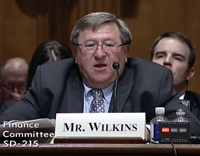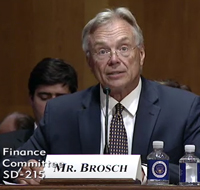The Senate Committee on Finance held a hearing Wednesday on “Trade Enforcement: Using Trade Rules to Level the Playing Field for U.S. Companies and Workers” addressing concerns that as new trade agreements are being considered those that are already in place are not being adequately enforced.
“Without strong enforcement, no trade deal – old or new – is able to live up to its potential for jobs and economic growth,” said Chairman Ron Wyden (D-OR). “And foreign companies that get unfair backing from their own governments will continue undercutting our manufacturers, farmers and ranchers.”
 American Soybean Association (ASA) Treasurer Richard Wilkins, a farmer from Delaware, testified before the committee about the importance of biotechnology to soybean farmers as the U.S. pursues trade agreements abroad.
American Soybean Association (ASA) Treasurer Richard Wilkins, a farmer from Delaware, testified before the committee about the importance of biotechnology to soybean farmers as the U.S. pursues trade agreements abroad.
“Other countries have adopted systems for approving biotech traits, but these decisions are subject to differing regulations or are overtly political, which can result in lengthy delays between approvals in importing and exporting countries,” he testified. “This is a concern because, until an importer approves a new trait, even a trace amount of that trait detected in a cargo can result in its rejection and major losses for the shipper.”Richard Wilkins, American Soybean Association, senate testimony
 International trade lawyer Kevin Brosch testified before the committee on behalf of the National Chicken Council, praising the Obama administration for successfully litigating a Chinese antidumping case for the poultry industry before the World Trade Organization (WTO). But he noted there are other cases not yet resolved, including one against Mexico was instituted nearly two years ago. “The NAFTA dispute settlement system depends upon the governments agreeing to formation of a panel,” he said. “At present, we still do not have a panel to hear the case. We believe there is a significant problem here of enforcement that needs to be addressed.”
International trade lawyer Kevin Brosch testified before the committee on behalf of the National Chicken Council, praising the Obama administration for successfully litigating a Chinese antidumping case for the poultry industry before the World Trade Organization (WTO). But he noted there are other cases not yet resolved, including one against Mexico was instituted nearly two years ago. “The NAFTA dispute settlement system depends upon the governments agreeing to formation of a panel,” he said. “At present, we still do not have a panel to hear the case. We believe there is a significant problem here of enforcement that needs to be addressed.”
